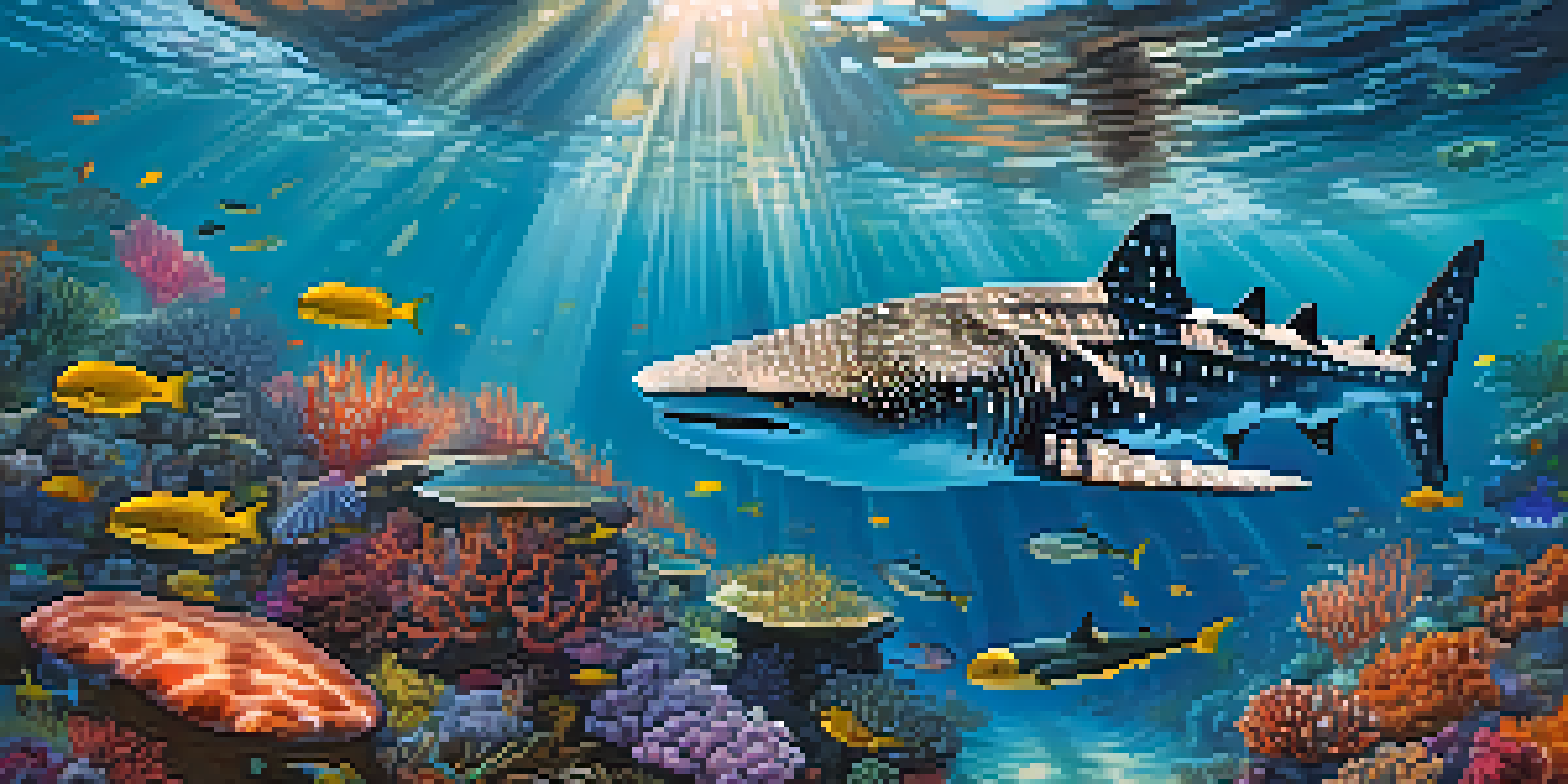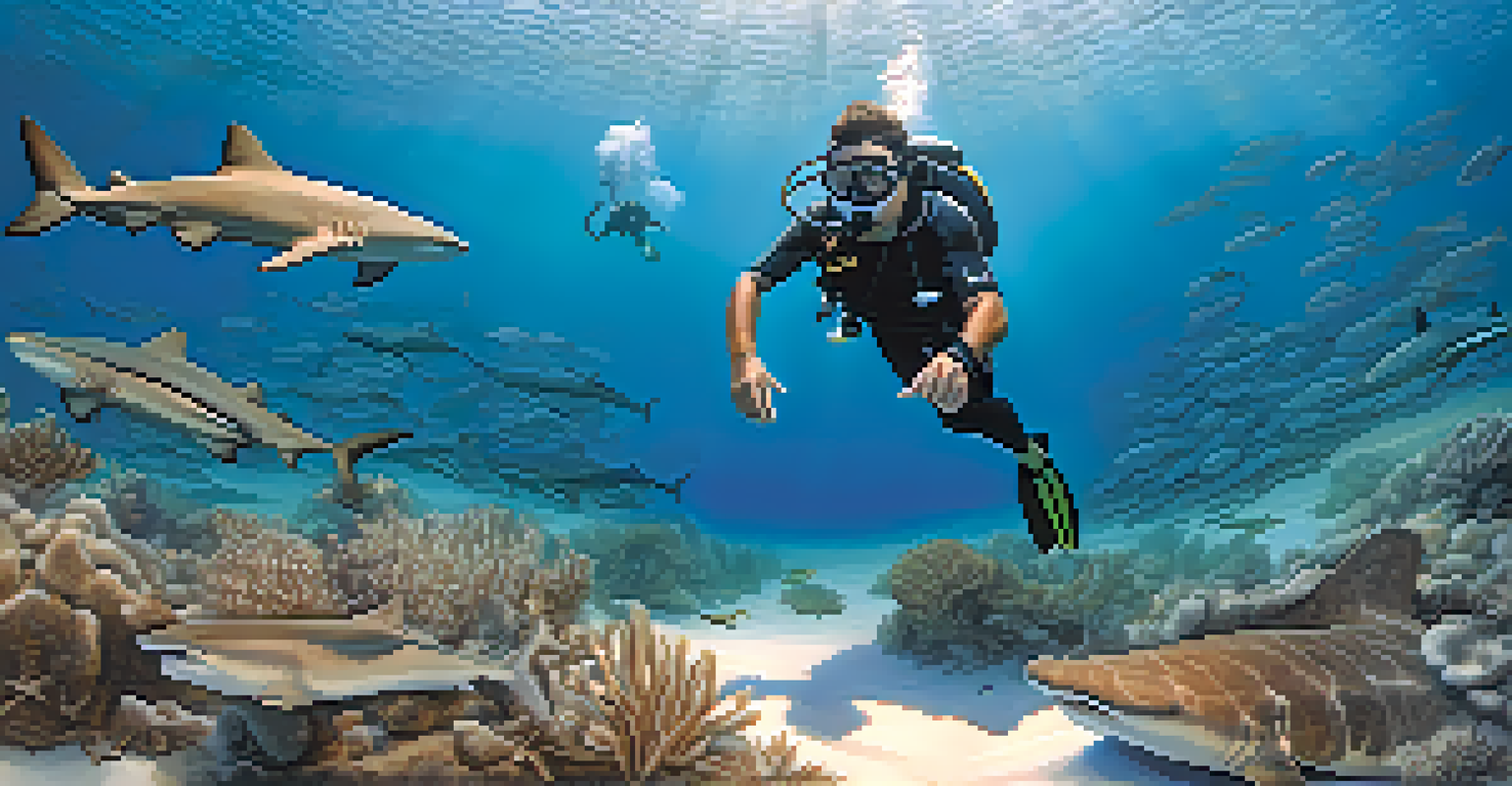Diving with Sharks: Is It Safe and How to Prepare?

Understanding Shark Behavior: Friend or Foe?
Sharks often evoke fear, but understanding their behavior is key to safe diving. Most shark species are not aggressive towards humans and are more curious than threatening. For instance, many divers report that sharks often approach them out of curiosity, not hostility. By learning how sharks communicate and behave, you can demystify them and feel more at ease underwater.
Sharks are misunderstood creatures that play a vital role in the ocean's health, and understanding their behavior can dispel the myths that surround them.
Sharks are primarily predators, but they typically don’t see humans as prey. They tend to avoid us, and incidents are rare when divers respect their environment. This means that knowing how to interact with these majestic creatures can significantly enhance your diving experience. Remember, a calm demeanor and respectful approach can go a long way in ensuring safety.
Additionally, certain species, like the docile whale shark or the playful nurse shark, are known for their gentle nature. Understanding the differences among species can help you choose the right dive experience. Ultimately, fostering a respect for sharks and their habitat is essential for both your safety and their conservation.
Choosing the Right Dive Location: What to Look For
When planning your shark diving adventure, location is everything. Popular spots like the Bahamas or South Africa offer some of the best experiences with diverse shark species. Researching the area can help you find a location known for safe encounters and experienced guides. The right dive site can make all the difference in your experience.

Consider the type of sharks you want to see and their seasonal behaviors. Some areas may have specific times when certain species are more prevalent, such as the annual migration of great whites. Engaging with local dive shops can provide valuable insights into the best times and locations for your adventure.
Understanding Shark Behavior
Most shark species are curious rather than aggressive, making safe diving possible with the right knowledge.
Lastly, always check for safety records and reviews of dive operators in the area. A reputable company will prioritize your safety and offer thorough briefings. Choosing the right operator not only enhances your experience but also ensures you are diving in a safe and controlled environment.
Essential Gear for a Safe Shark Diving Experience
Having the right gear can significantly enhance both your safety and enjoyment while diving with sharks. A wetsuit or drysuit provides thermal protection and can also help you feel more secure in the water. Additionally, a dive knife may be useful, though it should be used responsibly and only in emergencies.
The ocean is a symphony of life, and sharks are a crucial part of that orchestra. Protecting them ensures harmony in our marine ecosystems.
A dive computer is another essential piece of equipment. It helps monitor your depth and time underwater, ensuring you avoid decompression sickness. Investing in a good quality regulator and buoyancy control device is also critical as they affect your overall comfort and safety during the dive.
Finally, consider bringing an underwater camera to capture your experience safely. Just be sure it's securely attached to you, so it doesn't become a distraction. The right gear not only protects you but also allows you to focus on the incredible encounter with these magnificent creatures.
Pre-Dive Briefing: What You Should Know
Before diving, a thorough pre-dive briefing is crucial. This session typically covers safety protocols, dive site specifics, and what to expect in terms of shark behavior. Understanding the dive plan helps everyone feel more prepared and confident, which is essential for a successful experience.
During the briefing, your dive instructor will explain hand signals and communication methods to use underwater. This is particularly important when diving with sharks, as clear communication can prevent misunderstandings. Asking questions is encouraged; no question is too small when it comes to your safety.
Choosing Safe Dive Locations
Researching dive sites and operators ensures safe and rewarding encounters with sharks.
The briefing may also include guidelines for interacting with sharks, such as maintaining a respectful distance and avoiding sudden movements. Emphasizing safety and mutual respect for the sharks can enhance the experience for both divers and the creatures. Remember, preparation is key to a memorable dive.
Safety Protocols During Shark Dives: A Guide
Safety protocols are vital when diving with sharks, starting with remaining calm and composed. If a shark approaches, try to maintain eye contact and avoid panicking. Sharks are often deterred by sudden movements, so slow and deliberate actions are your best bet. This approach can help you experience the thrill of the encounter without escalating any tension.
It's also essential to dive in a group. There’s safety in numbers, and sharks are less likely to approach a larger group of divers. Additionally, staying close to your dive buddy allows you to communicate and support each other during the dive. Following your guide's instructions is crucial; they are trained to ensure your safety and enhance your experience.
Lastly, be aware of your surroundings and watch for signs of aggressive behavior from sharks. If you notice erratic movements or if a shark seems overly curious, signal to your group to maintain a safe distance. Following these protocols not only ensures your safety but also fosters a respectful environment for the sharks.
Post-Dive Reflection: What to Expect
After your dive, take some time to reflect on your experience. Many divers find that their encounters with sharks are exhilarating and transformative. Sharing stories with fellow divers can enhance the experience and create lasting memories. Discussing your feelings and observations helps process the encounter and reinforces the importance of shark conservation.
It's also a great time to review any footage or photos you may have captured. These visuals serve as a reminder of the majestic creatures you encountered and can inspire others to appreciate sharks. Many divers find that their experiences foster a deep respect for marine life and conservation efforts.
Importance of Shark Conservation
Sharks are vital to marine ecosystems, and understanding their role can inspire conservation efforts.
Lastly, consider how you can contribute to shark conservation. Being an advocate for these creatures and sharing your experiences can raise awareness about their importance in ocean ecosystems. Every little bit helps, and your story could inspire someone else to appreciate and protect these amazing animals.
Shark Conservation: Why It Matters
Shark conservation is crucial for maintaining the health of marine ecosystems. Sharks play a key role as apex predators, helping to regulate the population of other marine species. A balanced ecosystem ensures the survival of various species and the overall health of our oceans. By understanding their importance, we can better appreciate our encounters with them.
Unfortunately, many shark species face threats from overfishing, habitat loss, and climate change. Raising awareness about these issues is essential for promoting change. Participating in conservation efforts or supporting organizations dedicated to shark protection can make a difference.

Every diver has the power to contribute to shark conservation, whether through responsible diving practices or sharing their experiences. By fostering a community that values and respects sharks, we can help ensure that future generations will have the opportunity to encounter these magnificent creatures in the wild.